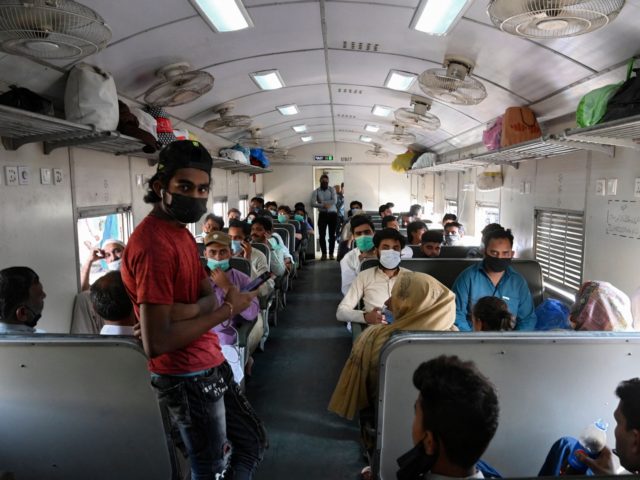Pakistan will ban people who have not been vaccinated against the Chinese coronavirus from traveling by train within the country starting October 1, the Pakistani online newspaper Dawn reported Tuesday.
Pakistani Minister for Planning, Development, and Special Initiatives Asad Umar “expressed concern over the spread of coronavirus in Rawalpindi and Peshawar” during a governmental meeting on August 10 “and decided to disallow people, who had not been inoculated, from travelling on trains from Oct[ober] 1,” according to Dawn.
Rawalpindi is located in the eastern Pakistani province of Punjab, which borders India. About 60 percent of Pakistan’s population of 225 million resides in Punjab. Peshawar is the capital of the western Pakistani province of Khyber Pakhtunkhwa and is home to roughly two million people.
Less than 7 million people in Pakistan have received a single dose of a Chinese coronavirus vaccine, while over 29 million others have received two doses, Pakistan’s National Command and Operation Centre (NCOC) for coronavirus reported on August 10.
“More than 8 million doses of COVID-19 [Chinese coronavirus] vaccines have arrived in Pakistan through COVAX so far, and more are on the way,” the United Nations Children’s Emergency Fund (UNICEF) reported on August 4. “This includes 2.4 million doses of AstraZeneca, 100,160 doses of Pfizer and 5.5 million doses of Moderna, the latter donated by the United States under COVAX’[s] dose-sharing mechanism.”
COVAX is a program headed by the United Nations’ health body, the World Health Organization (W.H.O.), which aims to provide free Chinese coronavirus vaccines to poor nations.
The Pakistani government has additionally procured nearly 30 million doses of Chinese coronavirus vaccine candidates “licensed in China through bilateral agreements,” according to UNICEF.
“The country recently started bottling PakVac, a one-dose COVID-19 [Chinese coronavirus] vaccine licensed from China, in view of delivering 3 million doses a month. The Government has also announced that it would buy 13 million doses of Pfizer COVID-19 vaccine over the coming months,” the U.N. agency revealed.
Pakistan’s Health Ministry is currently “prioritizing densely populated urban centers and ‘hotspot’ areas where the coronavirus spreads more easily” for vaccination efforts rather than “scattered rural communities,” according to UNICEF.
Pakistan has previous experience with mass vaccination campaigns, most notably against the poliovirus. Polio is a contagious viral illness caused by the poliovirus “that in its most severe form causes nerve injury leading to paralysis, difficulty breathing and sometimes death,” according to the Mayo Clinic.
Immunization against polio is higher in urban areas of Pakistan compared to rural areas, due in part to local resistance to vaccination in the countryside. Two gunmen on a motorcycle shot and killed a female polio vaccinator in Pakistan’s southwestern city of Chaman in April 2019. The incident marked the third murder of a person involved in Pakistan’s polio vaccine campaign within the span of a single week.
The Pakistani government “has started working on generating demand for the [Chinese coronavirus] vaccine,” according to UNICEF’s August 4 report. “This includes appealing to women, who are more fearful of side effects and have less access to information in conservative communities.”
Pakistan’s Ministry of Health is working “with support from UNICEF” to tackle “the proliferation of misinformation in a country which was already dealing with polio vaccine refusal in some areas,” according to the U.N. agency.

COMMENTS
Please let us know if you're having issues with commenting.